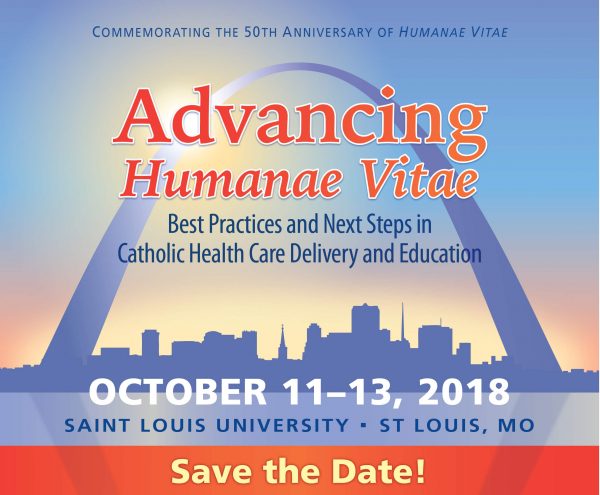What
A national conference sponsored by major Catholic health care and educational institutions, including The National Catholic Bioethics Center, the Archdiocese of St. Louis, Ascension, Catholic Health Services of Long Island, Franciscan Alliance, Geisinger Holy Spirit, Mercy, OSF HealthCare, Saint Louis University, and the St. Louis Guild of the CMA will commemorate the 50th anniversary of Humanae Vitae on October 11-13, 2018. “Advancing Humanae Vitae: Best Practices and Next Steps in Catholic Health Care Delivery and Education” will take place at Saint Louis University, St. Louis, Missouri. Participants will focus on how to better advance Humanae Vitae’s core principles within Catholic health care, particularly in providing care which promotes fertility awareness, fertility restoration, and women’s health, as well as in improving professional education.
Why
July 2018 will mark 50 years since Blessed Paul VI issued the encyclical Humanae Vitae, which reaffirmed the intrinsic connections between fertility and sexuality within the unity of marital love. Despite controversies in its reception, the core teachings of Humanae Vitae have been reaffirmed by subsequent popes, and the deepest concerns of Pope Paul have been validated.
Blessed Paul VI called on health care professionals in particular to help advance Church teachings on fertility and sexuality (Humanae Vitae #27). Many have responded to this call by engaging in scientific research and developing resources—from teaching and delivery systems to apps—in order to manage fertility and treat infertility without using birth control pills and without the use of those artificial reproductive technologies (ART) that separate the unitive and procreative dimensions of conjugal love. These contributions, which also advance women’s health, are a gift to the Church and the world.
These responses have been dwarfed, however, by substantial changes in health care: in the science and technology of contraception and ART, in the integration of contraceptives into standard health care services, and in the size and complexity of health care organizations, financing, and delivery systems. Addressing these changes constructively and strategically leveraging the resources of Catholic health care to advance the principles of Humanae Vitae are essential for promoting fertility awareness, fertility restoration, and women’s health, and for the vitality of the Catholic health care ministry.
Who Should Attend
Catholic health care administrators and leaders, including Sponsors and mission leaders
Health care professionals and providers, including physicians, PAs, NPs, nurses, pharmacists, and chaplains
Faculty at Catholic medical schools, nursing schools, and residency programs
Diocesan leaders, allied organizations, and health care ethicists
Topics to be Covered:
Scope and latest science of fertility awareness-based methods and services (FABMS)
Best practices in contemporary Catholic health care delivery — including system-sponsored programs, clinic-based programs, and small or solo practices
Educating more health care professionals to appreciate and to offer FABMS
Practical issues, including financing and delivery models, marketing and branding, and partnerships to advance the principles of Humanae Vitae










